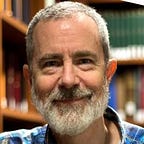Bringing Doubt into the Light
Paul Tillich’s Reflections on Doubt
Almost 20 years ago a caring friend gave me a book that I’ve been trying to understand even after multiple readings. Paul Tillich’s “The Courage To Be” is one of those books that you’re drawn to read again and again because you know its saying something significant but its just so darn hard to wrap your head around it because of the philosophical language. But as I’ve been re-reading “The Courage To Be” I’m drawn to some key sections that I’m beginning to understand more clearly because they speak loudly to me today; they “jump off the page” so to speak, as I think through some questions concerning doubt and faith that I’ve been asking lately. So I thought I’d simply cite just a few of Tillich’s gems, with the hope that some of it will hit you between the eyes, as it has been hitting me…
I’ll start with a question that he asks toward the end of the book…
“Is there a kind of faith which can exist together with doubt and meaninglessness?”
That question pretty well summarizes most of the questions floating around in my own head as I explore the phenomenon of faith vs. doubt. Tillich points to the tendency to make a “leap from doubt to dogmatic certitude” as a quick and easy way to overcome doubt. That idea of a “leap of faith” is, to me, simply an avoidance of dealing with the things that don’t make sense to the intellect, in order to end the conflict. So how would I answer Tillich’s question? Yes, I believe there must be a way to embrace faith in the midst of doubt… and I’m still looking for it. My faith tradition would seek to rush me through the process… come to a decision, because (as I’ve been told) to not make a decision is to decide “no.” I don’t buy into that reasoning.
“Doubt is the necessary tool of Knowledge.”
That seems abundantly clear. Doubt has always been a distinctive posture of humanity, starting with the very first man, Adam. God directs Adam to eat only the fruit of one particular tree. Adam goes with his gut, eats the forbidden fruit, and gains knowledge. Evangelical Christianity (rightly) sees that gaining of knowledge through the breaking of God’s law (although an act of sin) nevertheless a necessary step toward God; as the apostle Paul said it, “through the law comes the knowledge of sin.” Every aspect of life confirms that doubt is necessary to gaining knowledge. Even the establishment of scientific knowledge comes about only by experimentation until all doubt is eliminated. Very simply, it makes sense — in order to hold one belief as a truth, you have to doubt every other possibility.
“Doubt is a condition of all spiritual life…
The threat to spiritual life is not doubt as an element, but total doubt.”
I love this little nugget of truth — to Tillich, “total doubt” is the hopeless “loss of a spiritual center,” it is a threat to complete meaninglessness. That’s quite different from what he calls “doubt as an element” which “clings to affirmations that are not yet undercut.”
There’s a world of difference between the kind of doubt that brings hopelessness and despair and the kind of doubt that asks questions — real and legitimate questions that demand answers. One thinks of Thomas, a disciple of Jesus, who wasn’t satisfied that the resurrected Jesus was who he claimed to be until he actually felt the nail holes in his hands! “Doubting Thomas” we call him, as if we would have acted any differently.
Lastly, In his introduction to this book, Peter Gomes summarizes Tillich’s message, by presenting the following description of God:
“A God who is above and beyond the limits of our imagination…
A God beyond and above all that we doubt…
A God who remains after all other gods have proven themselves inadequate…
In other words, there is a God who emerges from the other side of doubt, and from that God we take courage.”
It is a profound image of God that Tillich presents in the book. Most importantly, he doesn’t view the presence of doubt as a problem. For Tillich (as for me) doubt is not an evil to be quickly overcome; rather, it is a good and necessary ingredient in the process of gaining a rock-solid knowledge of the truth… however long it takes.
